
| |
Volume 3, Number 125 |
|
"There's a Jewish story everywhere" |
|
Today's Postings:
Friday-Saturday, May 29-30, 2009
{Click on a link to jump to the corresponding story. Or, you may scroll leisurely through our report}
|
INTERNATIONAL
Obama: Stop Israeli settlements, Palestinian incitement ... White House text of the President's comments following meeting with Palestinian President Mahmoud Abbas READ MORE
Editor's Mailbox
Hamas operatives given prison terms by federal judge in Texas READ MORE
ZOA criticizes Obama proposal to fly U.N. flag over Temple Mount READ MORE
Israel, like U.S., has its emotional wedge issues ... by Ira Sharkansky in Jerusalem
Israel is going through a season of proclamations and legislative proposals that remind me of American campaigns about prayer in schools, abortions, and gay marriage.READ MORE
JUDAISM
Some background and some customs of Shavuot ... by Rabbi Shraga Simmons in Jerusalem
One of the holiest days of the Jewish year is also one of the least known. What is Shavuot really all about? READ MORE
Why do we eat cheesecake and other dairy foods on Shavuot?... from Soille San Diego Hebrew Day School in San Diego
There is a universal Jewish tradition of eating dairy foods on Shavuot. The reason has been offered by many scholars, some of which are more convincing than others. READ MORE
One is Jewish, other is not—should a rabbi officiate at the wedding, and what messages does the answer send? ... by Dan Schaffer in San Diego
This week, I find myself reflecting on a current issue in Reform Judaism—whether or not rabbis should officiate at mixed marriages I’m not sure if I’m of 2 minds, or if I’m confused. READ MORE
Bible in Pop Culture
... 'to shine upon the earth.' Genesis 1:15 VIEW IMAGE
STATE, LOCAL, MISCELLANEOUS
Editor's Mailbox
Rabbi Robbins to speak at St. Paul's on same-sex controversy READ MORE
Some new CDs by Jewish singers READ MORE
Media Watch, aka "Here's the Link"READ MORE
How does the census affect congressional districts? READ MORE
ARTS
Two haikus consider friends, Judaism in 17 syllables each .. by Sara Appel Lennon in San Diego READ MORE
The decline and fall of classical music began with audiences ... by David Amos in San Diego
If you have read my articles through the years, you know of the strong, positive tone which I try to convey, both about performances I have heard, and about the immediate future of classical music. But, let’s face it: Classical music is in trouble.READ MORE
JEWISH HISTORY
Adventures in San Diego Jewish History
Israeli Anniversary Day Program READ MORE
Temple Sisterhood Sponsors“Ditty Bag” Ball READ MORE
Fiesta Club Plans READ MORE
Go to top of right column |
|
Y.J.C. Club Holds Dance This Sunday READ MORE
Linda’s Lookout by Linda Solof READ MORE
Hadassah Highlights Child Welfare READ MORE
JEWISH INTERNET FAVORITES
We continue our examination of Jewish entertainers
Brian George plays Pakistani Babu Bhatt on Seinfeld VIEW VIDEO
Stephen Fry as a police officer with Hugh Laurie in a BBC comedy sketch, "your name sir."VIEW VIDEO
Joanna Gleason is the baker's wife in "Into the Woods"VIEW VIDEO
Jeff Goldblum is "Mr. Frost" with Kathy Baker VIEW VIDEO
INSIDERS' SDJW
We are always delighted to bring back for you works by longtime San Diego Jewish Times columnist Dan Schaffer, as we have in today's edition, with his look at the issue of whether rabbis should officiate at mixed marriages.
TODAY'S ADVERTISERS
America's Vacation Center
Balloon Utopia
Congregation Beth Israel
Jewish Community Foundation
Jewish Family Service
Jewish National Fund
Lawrence Family JCC
Math Is Easy
San Diego Community Colleges
San Diego Jewish Arts Festival
San Diego Jewish Chamber
Soille San Diego Hebrew Day School
Therapy in Motion Inc.
Tifereth Israel Synagogue
United Jewish Federation
XLNC-1 Radio
DEDICATIONS
Each day's issue may be dedicated by readers—or by the publisher—in other people's honor or memory. Past dedications may be found at the bottom of the index for the "Adventures in San Diego Jewish History" page.
NOTE
PLEASE HELP US POLICE THIS SITE: If you see anything on this site that obviously is not in keeping with our mission of providing Jewish news and commentary, please message us at editor@sandiegojewishworld.com, so that we can fix the probem. Unfortunately, large sites like ours can be subjected to tampering by outsiders. Thank you!
E-MAIL NOTICES
To receive San Diego Jewish World's daily or weekly headlines, click the blue box below:
|
|
|

Obama: Stop Israeli settlements, Palestinian incitement
|
WASHINGTON, D.C. (Press Release)--Thursday afternoon President Obamaheld a one-on-one meeting, and then an expanded meeting with Palestinian Authority President Mahmoud Abbas. Here are the President's opening remarks when they spoke to the press together afterwards:
PRESIDENT OBAMA: Hello, everybody. Well, it is a great pleasure to welcome President Abbas to the Oval Office. We had -- we just completed an extensive conversation, both privately as well as with our delegations, about how we can advance peace in the Middle East and how we can reaffirm some core principles that I think can result in Palestinians and Israelis living side by side in peace and security.
As I've said before, I've been a strong believer in a two-state solution that would provide the Israelis and Palestinians the peace and security that they need. I am very appreciative that President Abbas shares that view. And when Prime Minister Netanyahu was here last week I reiterated to him that the framework that's been provided by the road map is one that can advance the interests of Israel, can advance the interests of the Palestinian people, and can also advance the interests of the United States.
We are a stalwart ally of Israel and it is in our interests to assure that Israel is safe and secure. It is our belief that the best way to achieve that is to create the conditions on the ground and set the stage for a Palestinian state as well. And so what I told Prime Minister Netanyahu was is that each party has obligations under the road map. On the Israeli side those obligations include stopping settlements. They include making sure that there is a viable potential Palestinian state. On the Palestinian side it's going to be important and necessary to continue to take the security steps on the West Bank that President Abbas has already begun to take, working with General Dayton. We've seen great progress in terms of security in the West Bank. Those security steps need to continue because Israel has to have some confidence that security in the West Bank is in place in order for us to advance this process.
And I also mentioned to President Abbas in a frank exchange
Go to top of right column
|
|
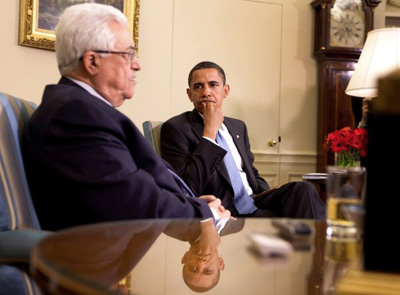
that it was very important to continue to make progress in reducing the incitement and anti-Israel sentiments that are
sometimes expressed in schools and mosques and in the public square, because all those things are impediments to peace.
The final point that I made was the importance of all countries internationally, but particularly the Arab states, to be supportive of a two-state solution. And we discussed how important it is that the Arab states, building off of some of the recognition of the possibilities of the two-state solution that are contained in the Arab Peace Initiative continue to provide economic support, as well as political support, to President Abbas's efforts as he moves the Palestinian Authority forward, as he continues to initiate the reforms that have taken place, and as he hopefully is going to be able to enter into constructive talks with the Israelis.
So, again, I want to thank President Abbas for his visit and a very constructive conversation. I am confident that we can move this process forward if all the parties are willing to take on the responsibilities and meet the obligations that they've already committed to, and if they keep in mind not just the short-term tactical issues that are involved, but the long-term strategic interests of both the Israelis and the Palestinians to live side by side in peace and security.
So, thank you again, Mr. President.
|
|
|
|
Go to top of page
|

Editor's Mailbox: International news of Jewish interest
|
Hamas operatives given prison terms by federal judge in Texas
WASHINGTON, D.C.--U.S. District Judge Jorge A. Solis in Dallas on Wednesday sentenced the Holy Land Foundation for Relief and Development (HLF) and five of its leaders following their convictions by a federal jury in November 2008 on charges of providing material support to Hamas, a designated foreign terrorist organization.
The sentences "mark the culmination of many years of painstaking investigative and prosecutorial work at the federal, state and local levels. All those involved in this landmark case deserve our thanks," said David Kris, assistant attorney general for national security. "These sentences should serve as a strong warning to anyone who knowingly provides financial support to terrorists under the guise of humanitarian relief."
HLF was incorporated by Shukri Abu Baker, Mohammad El-Mezain, and Ghassan Elashi. Mufid Abdulqader and Abdulrahman Odeh worked as fund raisers. Together, with others, they provided material support to the Hamas movement.
Shukri Abu Baker, 50, of Garland, Texas, was sentenced to a total of 65 years in prison. He was convicted of 10 counts of conspiracy to provide, and the provision of, material support to a designated foreign terrorist organization; 11 counts of conspiracy to provide, and the provision of, funds, goods and services to a Specially Designated Terrorist; 10 counts of conspiracy to commit, and the commission of, money laundering; one count of conspiracy to impede and impair the Internal Revenue Service (IRS); and one count of filing a false tax return.
Mohammad El-Mezain, 55, of San Diego, California, was sentenced to the statutory maximum of 15 years in prison. He was convicted on one count of conspiracy to provide material support to a designated foreign terrorist organization.
Ghassan Elashi, 55, of Richardson, Texas, was sentenced to a total of 65 years in prison. He was convicted on the same counts as Abu Baker, and one additional count of filing a false tax return.
Mufid Abdulqader, 49, of Richardson, Texas, was sentenced to a total of 20 years in prison. He was convicted on one count of conspiracy to provide material support to a designated foreign terrorist organization, one count of conspiracy to provide goods, funds, and services to a specially designated terrorist, and one count of conspiracy to commit money laundering.
Abdulrahman Odeh, 49, of Patterson, New Jersey, was sentenced to 15 years in prison. He was convicted on the same counts as Abdulqader.
HLF, now defunct, was convicted on 10 counts of conspiracy to provide, and the provision of, material support to a designated foreign terrorist organization; 11 counts of conspiracy to provide, and the provision of, funds, goods and services to a Specially Designated Terrorist; and 10 counts of conspiracy to commit, and the commission of, money laundering.
The Court reaffirmed the jury’s $12.4 million money judgment against all the defendants, with the exception of El Mezain, who was not convicted of money laundering.
From its inception, HLF existed to support Hamas. Before HLF was designed as a Specially Designated Terrorist by the Treasury Department and shut down in December 2001, it was the largest U.S. Muslim charity. It was based in Richardson, Texas, a Dallas suburb. The "material support statute," as it is commonly referred to, was enacted in 1996 as part of the Antiterrorism and Effective Death Penalty Act. That statute recognizes that money is fungible, and that money in the hands of a terrorist organization — even if for so called charitable purposes — supports that organization’s overall terrorist objectives.
The government presented evidence at trial that, as the U.S. began to scrutinize individuals and entities in the U.S. who were raising funds for terrorist groups in the mid-1990s, the HLF intentionally hid its financial support for Hamas behind the guise of charitable donations. HLF and these five defendants provided approximately $12.4 million in support to Hamas and its goal of creating an Islamic Palestinian state by eliminating the State of Israel through violent jihad.
The government’s case included testimony that in the early 1990's, Hamas’ parent organization, the Muslim Brotherhood, planned to establish a network of organizations in the U.S. to spread a militant Islamist message and raise money for Hamas. The government’s case also included testimony about Hamas material found in zakat committees. The defendants sent HLF-raised funds to Hamas-controlled zakat committees and charitable societies in the West Bank and Gaza. Zakat is an Arabic word referring to the religious obligation to give alms.
HLF became the chief fundraising arm for the Palestine Committee in the U.S. created by the Muslim Brotherhood to support Hamas. According to a wiretap of a 1993 Palestine Committee meeting in Philadelphia, former HLF President and CEO Shukri Abu Baker, spoke about playing down their Hamas ties in order to keep raising money in the U.S. Another wiretapped phone call included Abdulrahman Odeh, HLF’s New Jersey representative, referring to a suicide bombing as "a beautiful operation."
The government also presented evidence that several HLF defendants have family members who are Hamas leaders, including Hamas’ political chief, Mousa Abu Marzook, who is married to a cousin of Ghassan Elashi, HLF’s former Chairman of the Board. Ghassan Elashi, who also served as the vice-president of marketing for Infocom Corporation, is currently serving an 80-month sentence following his conviction on several charges related to export violations. Mohammed El-Mezain was HLF’s Director of Endowments and Mufid Abdulqater was a major HLF fundraiser. Two named defendants, Akram Mishal and Haitham Maghawri are fugitives.
The defendants provided financial support to the families of Hamas martyrs, detainees, and activists knowing and intending that such assistance would support the Hamas terrorist organization. Since 1995, when it first became illegal to provide financial support to Hamas, HLF provided approximately $12.4 million in funding to Hamas through various Hamas-affiliated committees and organizations located in Palestinian-controlled areas and elsewhere.
During trial, the government also presented evidence that HLF was so concerned about investigators uncovering the group’s intentions that they kept a manual entitled "The Foundation’s Policies and Procedures." HLF followed various security procedures outlined in the manual to include hiring a security company to search the HLF for listening devices, ordering defendant Haitham Maghawri, a fugitive, to take training on advanced methods in detecting wiretaps, shredding documents after board meetings, and maintaining incriminating documents in off-site locations.
The case was investigated by the Joint Terrorism Task Force, involving agents from federal, state, and local agencies including: FBI, IRS - Criminal Investigation, U.S. Immigration and Customs Enforcement (ICE), Department of State, U.S. Secret Service, U.S. Army Criminal Investigation Division, the Texas Department of Public Safety, and the Dallas, Plano, Garland and Richardson, Texas, Police Departments. In addition, the Department of Justice Criminal Division’s Asset Forfeiture and Money Laundering Section provided assistance.
The case was prosecuted by James T. Jacks, acting U.S.
Go to top of right column
| |
Attorney; Barry Jonas, Trial Attorney for the Department of
Justice Counter-terrorism Section; and Elizabeth J. Shapiro, Deputy Director, Federal Programs Branch, Department of Justice, serving as a Special Assistant U.S. Attorney.
NEW YORK (Press Release)—The Zionist Organization of America (ZOA) is strongly opposing President Barack Obama’s call for United Nations flag to replace Israel’s flag flying over eastern Jerusalem’s holy places, including the Western Wall (HaKotel HaMa’aravi), the holiest shrine in Judaism outside the Temple Mount, which forms the only surviving section of the outer wall that once surrounded the biblical temples.
King Abdullah II of Jordan said that President Obama put forward the proposal during his visit to the White House last month. Israeli Prime Minister Binyamin Netanyahu has implicitly rejected President Obama’s idea, stating emphatically in a speech in a Jerusalem seminary, Mercaz Harav, that the Israeli flag will continue to fly over the Western Wall: “The flag that flies over the Kotel is the Israeli flag... Our holy places, the Temple Mount – will remain under Israeli sovereignty forever.”
Prime Minister Netanyahu’s vow on Jerusalem was made in the presence of Israel’s two chief rabbis, Likud Knesset Member and former IDF Chief of Staff Moshe Yaalon, and Jewish Home party chairman MK Rabbi Daniel Hershkowitz. It was the second time during the day he promised to keep the city united, having stated earlier in the day that “Jerusalem was always ours, will always be ours, and will never again be divided”
Between 1949 and 1967, the religious sites in the City, as well as all of Judea and Samaria, had been under the control of Jordan, which forbade entry of Jews to the Western Wall (Kotel) and other holy places, as well as barring Christians from churches. Israel immediately opened all holy sites to all religions after the entire city was re-united in 1967, returning the Old City to Israeli sovereignty after nearly 2,000 years.
ZOA National President Morton A. Klein said, “President Obama’s proposal to replace Israel’s flag with that of the UN over Jerusalem’s holiest sites is not simply mistaken and offensive to Jews and Christian Zionists everywhere, but damaging to the cause of peace. Having made it, it will become irresistible for Arabs to add it to their own demands, manufacturing another pretext for violence and hostility when in truth these remain motivated by one thing: the desire to eliminate Israel as a sovereign Jewish state.
“President Obama’s idea is deeply disappointing and misconceived. Moreover, it is a slap in the face to Israel, which only two years ago celebrated the re-unification of the city, the end of the barbed wire and military emplacements that divided and endangered the western half of the city before 1967, and the restoration of the historic Jewish quarter that had been ransacked and largely destroyed by the illegal Jordanian occupiers.
"
It is also not unfair to note that the UN, neither in 1948, nor in 1967, came to the protection of Jerusalem when it was besieged and assaulted. Under international law, the UN has never acquired authority in Jerusalem by any of the processes recognized by law – cession, occupation, subjugation, accretion or prescription.
“The President needs to remember that Jerusalem is mentioned over 700 times in Jewish sacred texts, and not once in the Muslim Qur’an. He needs to recall that in the 19 years it was controlled by Jordan, no Arab leader even visited the city; it was left to become a slum, with few homes having electricity or running water. Moreover, Jerusalem has never served as the capital of any state that ever controlled it, except Israel.
“We applaud Prime Minister Netanyahu’s statements that he will maintain Israeli authority, including the Israeli flag, flying over eastern Jerusalem’s holy places.”
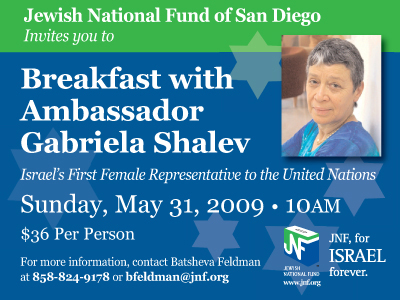



|
Return to top

LETTER FROM JERUSALEM
Israel, like U.S., has its emotional wedge issues
|
By Ira Sharkansky
 JERSUALEM—Israel is going through a season of proclamations and legislative proposals that remind me of American campaigns about prayer in schools, abortions, and gay marriage. JERSUALEM—Israel is going through a season of proclamations and legislative proposals that remind me of American campaigns about prayer in schools, abortions, and gay marriage.
The equivalents here are a proposals to outlaw the mourning of Israel's existence (Nakba) by the country's Arabs, jail sentences for those who deny the Jewish character of the country, and rabbinical demands that soldiers refuse orders to remove settlements.
What links these Israeli and American issues is their capacity to inflame marginal issues with religious fanaticism.
I will let those closest to the American scene ponder their pros and cons. The Israeli cases are enough to worry me.
The holiday of Shavuot may be adding to the efforts of religious activists. It commemorates the giving of the Torah to Moses on Mt. Sinai. Religious Jews mark it by studying the law, including rabbinical interpretations delivered from then until now, all night long. Commentators are emphasizing the Lord's grant of the land to Israel.
Another impetus to this flurry of activity is the election of a right-wing government, whose components include Jewish approximations to Christian conservatives who expected action from Ronald Reagan and George W. Bush. Prime Minister Benyamin Netanyahu made his own contribution when he said that Palestinian representatives must recognize Israel as a Jewish state as a condition for moving forward on bi-lateral negotiations.
Netanyahu has a point in the context of Palestinian demands that Israel remove Jews from the territory that should become their state, and that Palestinian refugees be given the right of return to what became Israel. Mahmoud Abbas is saying on the eve of his visit to Washington that he has no intention of flooding Israel with five million refugees. It would help if he said that, in Arabic, to his own population. The Hamas leadership, in control of Gaza and perhaps the most powerful party in the West Bank, is describing Abbas as an illegitimate claimant whose term expired in January, and who cannot speak for the Palestinian people.
We can argue if Netanyahu's demand for Palestinian recognition of Israel as a Jewish state is just, superfluous, or just a clever way to avoid serious negotiations. Whatever he intends, he has lowered the barrier against other issues that are inflammatory with respect to the delicate balance between Jews and Arabs within Israel, as well as between religious and secular Jews.
Although tense, and occasionally violent, relations between Israeli Jews and Arabs have been managed with some success. It helps that there are opportunities for nationalist expression, usually checked only when religious or political figures cross the boundaries against overt incitement to violence, or give aid to an enemy state. There is considerable freedom of instruction in Arab language schools. Arab members of Knesset visit enemy countries and suffer no more than rebuke from their Jewish colleagues and interrogation by security personnel upon their return. MK Azmi Beshara has not been in Israel since he was said to violate the rules by supporting military action against Israel while in Lebanon during the 2006 War, and provided to the enemy sensitive information about Israeli forces.
It may offend Jews when Arab citizens mourn the state's creation each year on May 15th. However, outlawing the occasion or insisting on explicit expressions of loyalty may cause more trouble by driving nationalism underground, and adding to its intensity.
A prominent safety valve for the feelings of Israeli Arabs are the speeches given by their representatives in the Knesset. The Arab parties do not get much more than the opportunity to speak. Resources allocated to Arab constituents do not match those allocated to Jews. The situation is similar in Jerusalem, where almost all Arabs boycott local elections on the claim that Israel has illegally occupied Arab neighborhoods.
One can debate the fairness or the wisdom of allocations to Arabs by national and local governments. They would change if Arabs used their voting potential to bargain for tangible
Go to top of right column
| |
benefits. It is easy to dismiss claims of injustice by noting that Arab politicians give greater priority to persistent criticism than to obtaining more services for their people.
Whenever authorities ratchet up their courage and embark on a process of removing small and "illegal" settlements from the West Bank, we can expect some rabbis to say that soldiers should disobey orders that violate the supreme law of the Torah. We also expect counter expressions, from religious Jews and rabbis, that military discipline is essential to Jewish survival.
The military is seeking to avoid responsibility for removing settlers. The head of the general staff says that the police are more suitable for such work. The police is a force composed of volunteers, trained for the non-lethal control of hostile civilians. They are not troubled by highly motivated religious draftees, who make excellent soldiers when sent against Israel's enemies, but are vulnerable to the calls of extremist rabbis who may have been among their teachers.
Involved in the flurry of rhetoric concerning settlements is what we could have expected from the prime minister. He returned from Washington with assuring statements that he and President Obama agreed on all the essentials. He said there would be no freeze in settlements. Natural growth would be allowed, in the building of housing for settlers' offspring, as would expansions already agreed by Israeli planning authorities. There would be negotiations about removing some illegal settlements, or making them legal by fusing them with nearby communities. Secretary of State Hillary Clinton countered by saying that American policy remains opposition to all settlement activity, of any kind.
The current flurries of excitement may disappear without lasting impact. This is not the first time that MK's have garnered support for laws requiring Arab expressions of loyalty. As in the past, they may not find their way out of Knesset committees. If they do become law, they will have to pass an inevitable appeal to the Supreme Court, likely to be tilted against them. If they pass that hurdle, they may meet delay or dilution in the process of implementation.
The Labor Party's principal representative in the government, the Defense Minister, has been exercising his responsibility for the West Bank by removing some of the smallest and most isolated of the settlements considered to be illegal. The process has not touched the areas of greatest sensitivity, and it is not yet clear if the settlers removed are again setting up tents on the disputed sites.

|
|
|
Return to top

|
GUEST COLUMN
Some background and some customs of Shavuot
|
By Rabbi Shraga Simmons
JERUSALEM--One of the holiest days of the Jewish year is also one of the least known. What is Shavuot really all about?
It is ironic that Shavuot is such a little-known holiday. Because in fact, Shavuot commemorates the single most important event in Jewish history -- the giving of the Torah at Mount Sinai.
Shavuot is the culmination of the seven-week-long "counting of the Omer" that occurs following Passover. The very name "Shavuot" means "weeks," in recognition of the weeks of anticipation leading up to the Sinai experience. (Since Shavuot occurs 50 days after the first day of Passover, it is sometimes known as "Pentecost," a Greek word meaning "the holiday of 50 days.")
3,300 years ago, after leaving Egypt on the night of Passover, the Jews traveled into the Sinai desert. There, the entire Jewish nation -- 3 million men, women and children -- directly experienced divine revelation:
God spoke to you from the midst of the fire; you were hearing the sound of words, but you were not seeing a form, only a sound. He told you of His covenant, instructing you to keep the Ten Commandments, and He inscribed them on two stone tablets. (Deut. 4:12-13)
The giving of the Torah was an event of awesome proportions that indelibly stamped the Jewish nation with a unique character, faith and destiny. And in the 3,300 years since this event, Torah ideals and values- monotheism, justice, responsibility -- have become the moral basis for Western civilization.
HOW TO CELEBRATE
Perhaps the reason for the relative obscurity of Shavuot is because this holiday has no obvious "symbols" of the day -- i.e. no Shofar, no Sukkah, no Chanukah Menorah.
On Shavuot, there are no symbols to distract us from the central focus of Jewish life: the Torah. So how do we commemorate Shavuot? It is a widespread custom to stay up the entire night learning Torah. And since Torah is the way to self-perfection, the Shavuot night learning is called Tikkun Leil Shavuot, which means "an act of self-perfection on the night of Shavuot."
At synagogue services on Shavuot morning, we read the biblical book of Ruth. Ruth was a non-Jewish woman whose love for God and Torah led her to convert to Judaism. The Torah intimates that the souls of eventual converts were also present at Sinai, as it says: "I am making [the covenant] both with those here today before the Lord our God, and also with those not here today." (Deut. 29:13)
Ruth has a further connection to Shavuot, in that she became the ancestor of King David, who was born on Shavuot, and died on Shavuot.
On Shavuot, it is customary to decorate the synagogue with branches and flowers. This is because Mount Sinai blossomed with flowers on the day the Torah was given. The Bible also associates Shavuot with the harvest of wheat and fruits, and marks the bringing of the first fruits to the HolyTemple as an expression of thanksgiving. (see Exodus 23:16, 34:22, Numbers 28:26)
Why do we eat cheesecake and other dairy foods on Shavuot?
SAN DIEGO (Press Release)--There is a universal Jewish tradition of eating dairy foods on Shavuot. The reason has been offered by many scholars, some of which are more convincing than others.
We offer a selection:
1. The Biblical book Song of Songs (4:11) refers to the sweet nourishing value of Torah by saying: "It drips from your lips, like honey and milk under your tongue."
2. The verse in Exodus 23:19 juxtaposes the holiday of Shavuot with the prohibition of mixing milk and meat. On Shavuot, we therefore eat separate meals -- one of milk and one of meat.
3. Upon receiving the Torah at Mount Sinai, the Jews immediately became obligated in the laws of Sh'chita -- slaughter of animals. Since they did not have time to prepare kosher meat, they ate dairy instead.
4. Who doesn't love a good cheesecake?
Go to top of right column
| |




|
Go to top of page
One is Jewish, other is not—should a rabbi officiate at the wedding, and what messages does the answer send?
|
|
By Dan Schaffer
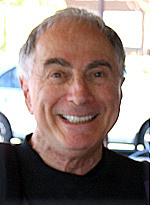 SAN DIEGO --This week, I find myself reflecting on a current issue in Reform Judaism—whether or not rabbis should officiate at mixed marriages I’m not sure if I’m of 2 minds, or if I’m confused. As far as I know, this is a problem that has to do only with Reform congregations, so if you’re not Reform, you’re welcome to eavesdrop on this internal difference in opinion. SAN DIEGO --This week, I find myself reflecting on a current issue in Reform Judaism—whether or not rabbis should officiate at mixed marriages I’m not sure if I’m of 2 minds, or if I’m confused. As far as I know, this is a problem that has to do only with Reform congregations, so if you’re not Reform, you’re welcome to eavesdrop on this internal difference in opinion.
At least since 1909, Reform rabbis (through their Central Conference of American Rabbis, have opposed any official participation at marriages between Jews and non-Jews. In 1985, a group of Reform rabbis called the “Committee of 100” decided to reaffirm this stand. This decision came because so many Reform rabbis do officiate at such marriages. Even rabbis serving in the same temple have had differing views on the subject.
The argument of the Committee of 100 was that the rabbi represents the Jewish community when he blesses the couple . (The bride and groom marry each other). Through the couple, though, the rabbi invokes the Covenant between God and the Jewish people. The bride and groom consecrate themselves to each other, according to the heritage of Moses and Israel. If one of the partners is not Jewish, then there is no sense in the rabbi performing his or her traditional role. The couple can still be married in a civil ceremony; they can still belong to a Reform temple, and they can raise their children as Jews.
But the question is raised; if the couple can do all these positive things after the marriage, why shouldn’t a Reform rabbi marry them, too? Is it possible that the rabbi’s refusal might drive the couple away from Judaism?
The Committee of 100 answered that if the Jewish marriage partner is alienated from Judaism, it isn’t because of the marriage ceremony, but because of deeper roots running farther back. The Committee felt that it’s better for the rabbi to explain to the partners why he or she can’t perform the marriage, rather than agreeing to a watering down of the Jewish heritage. (These rabbis emphasize that a mixed marriage is one where one of the partners is not Jewish—it is not a mixed marriage where the non-Jew has previously converted to Judaism.)
Then the next question arises: what about Reform rabbis who do perform mixed marriages? They have no ‘Committee of 100’ (or more) to speak for them. From what I understand, though, these rabbis feel that they are keeping a tie between the marrying couple and the Jewish community. That tie may be tenuous but might grow stronger; a break is more difficult to knit. It’s better than cutting them off completely.
Go to the top of right column
| |
These rabbis believe that since we live in a pluralistic , free society we must accept the fact that many of our young people will intermarry and that we had better do our part to give them options for remaining Jewish. If they are treated with kindness and affirmation at marriage time, they will be more likely to return to Judaism with the passing years and with the children that those years bring. The rabbi can be a welcoming presence, even though he or she will not invoke Moses and the people of Israel.
Further, almost all (if not all) rabbis who perform mixed marriages impose at least 2 conditions: 1) the promise that the children will be raised as Jews, and 2) the commitment of the non-Jewish spouse to be open to Judaism and study it. Some rabbis say that within the first year of such marriages, about half of the non-Jewish partners do decide to convert.
One thing, though, is common. Reform rabbis on both sides of the issue welcome the mixed couples into their congregations. Both will accept the children as Jews, as long as either the mother or father is Jewish.
It’s here that confusion lies. If one says what the couple is doing is not a Jewish thing, doesn’t the subsequent welcome give a signal that the mixed marriage is no real impediment to being part of the Jewish community? My 2 minds say, one the one hand, that marriage ceremonies are very important to Judaism. If mixed marriages aren’t correct, there should be some kind of sanction within the community after the ceremony. If there is no sanction, then it shouldn’t matter to the couple if the rabbi marries them, or in what temple (or church) they’re married. Regardless, they are free to enter the Reform congregation of their choice.
Though my sympathies are with rabbis who perform mixed marriage ceremonies, my strongest argument against those who won’t is that they’re sending mixed signals to the mixed couples; no marriage ritual, but most of the temple rights and privileges thereafter. If we raised children in the same way, they’d learn never to take seriously our negative commands We call kids raised that way “spoiled” and “confused.” Adults given the same signals are probably beyond spoiling, though they’re probably as confused as I am.
|
|
|
|
Go to top of page

Bible in Pop Culture: '... to shine upon the earth
|
|
Genesis 1:15
and they shall serve as luminaries in the firmament of the heaven to shine upon the earth."
Do you have a photo that you think illustrates how a biblical verse has worked its way into pop culture. Please send it to us for possible publication in this series, "The Bible in Pop Culture."
You may send your jpg photo for posting online to us at San Diego Jewish World, emailing it to editor@sandiegojewishheritage.com. If possible, please send it at 72dpi resolution and 400 pixels wide. Please include the name of the photographer, the date and place the photo was taken, and any other relevant caption information.
For our growing "Pop Bible" collection please see Bible in pop culture index
| |
Go to top of page

Editor's Mailbox: Local, state and miscellaneous news
|
Rabbi Robbins to speak at St. Paul's on same-sex controversy
SAN DIEGO (Press Release)--An interfaith service in opposition to the recent decision by the California Supreme Court to uphold Proposition 8, which banned same-sex marriages, will be conducted at St. Paul's (Episcopal) Cathedral at 7 p.m., Monday, June 1.
Among participating clergy will be Rabbi Rochelle Robbins, whose biography on the Academy of Jewish Religion website describes her as follows:
"Rabbi Rochelle Robins was ordained at the New York campus of the Hebrew Union College – Jewish Institute of Religion in 1998. She served as the Rabbinic Staff Chaplain at the Hospital of the University of Pennsylvania, the Supervisor of Pastoral Education and Co-coordinator of the Jewish Hospice Program at Samaritan Hospice of So. New Jersey, and is a certified Associate Supervisor in Clinical Pastoral Education.
"
Rabbi Robins is a Co-founder and the Executive Director of Bat Kol, an organization that began as Jerusalem's first feminist yeshiva. Bat Kol has expanded its mission to include interfaith coalition building and health care education in the United States.
"
Rabbi Robins is currently the Associate Director for the Clinical Pastoral Education program at the Center for Urban Chaplaincy in San Diego, CA. She is also serving as a per diem chaplain and rabbinic consultant at The Elizabeth Hospice in Escondido, CA., providing rabbinic support and pastoral care for its Jewish Hospice Program.
"
Rabbi Robins is also a published writer of articles which focus on Jewish text and pastoral theology. Whether Rabbi Robins is teaching text, assisting patients and family members, training chaplains, or administrating Bat Kol projects, healing and wholeness is at the heart of her rabbinate. "
In announcing the service at the cathedral at 2728 6th Avenue, the Very Rev. Scott Richardson, Dean of St. Paul’s Cathedral, said: "The ruling by the California Supreme Court upholding the outcome of Prop 8 perpetuates the unequal treatment of same-sex couples in our state and sets a terrible precedent in allowing a simple majority of California voters to deny a fundamental right away to millions of citizens. .. This ruling violates our Christian commitment to respect the dignity of every human being. Saint Paul's Cathedral continues to call for one relational standard to apply to all people, a standard rooted in the core Christian values of fidelity, mutual regard, and life-long commitment.”
Richardson noted that when the decision was announced "Members and clergy of the Cathedral congregation gathered on the evening of May 26 to join the rally protesting the court’s decision. The Cathedral displayed prominently a rainbow flag and a large banner proclaiming 'Love to Each of You from St. Paul’s Cathedral.'"
More information about the interfaith "Service of Consolation and Determination" is available from the Cathedral at (619)298-7261
Some new CDs by Jewish singers
We've been advised recently of two new CDs by Jewish singers.
Inbar Bakal, revitalizing Yemenite Jewish music, has issued "Song of Songs" on the Electrofone label.
Candye Kane, who is homebased in San Diego and who is a cancer survivor, has Superhero on the Delta Grooves label.
Media Watch, aka "Here's the Link"
North County Times published a feature on Thursday about Adam Lambert's stage career in San Diego before American Idol catapulted him to national stardom. Here's the link.
San Diego News Network carried a story about teenager Jacqueline Coden raising money by text phone to fight ovarian cancer suffered by her grandmother Betty Nederlander. Here's the link.
Go to the top of right column
|
|
San Diego Union-Tribune reported on Thursday that University of California President Mark Yudof defended the UC against legislators angry over high pay for chancellors, among other issues. Here's the link ... Secretary of State Hillary Clinton says Israel should stop all settlements growth, period. Here's the link... Maurice Eis, a Jewish War Veteran who served the U.S. Army as an interpreter years after he himself had been a Dachau inmate, has died. Here's the link. .. On its editorial page, the U-T suggested the intraparty rivalries in the GOP resemble a "food fight." House Minority Whip Eric Cantor was among those mentioned. Here's the link.
How does the census affect congressional districts?
SAN DIEGO (Press Release)--The National Atlas tells us that the U.S. Census Bureau is required to take a census of population every ten years, during the year ending with zero. According to the Constitution of the United States, this decennial census has one fundamental purpose: to ensure that number of seats each State has in the U.S. House of Representatives reflects the relative size of the State's population as compared with other States.
There are 435 representatives divided among the 50 States. Each of these representatives is elected by the voters of a congressional district. Each congressional district is to be as equal in population to all other congressional districts in the State as practicable, based on the decennial census counts. The number of congressional districts in each State may change after a decennial census, although each state, however small, must have at least one seat.
After the number of seats assigned to the individual States are determined (apportionment), the task of drawing the new congressional districts (redistricting) is generally given to each State legislature. Congressional district boundaries may be changed more than once during a decade.
As of the 2000 census the average population per district was 646,946 people.
The population of the US is estimated to be about 300,000,000 in 2009 and could grow by the time of the 2010 census. Whatever the population will be, it will be divided by the 435 districts to determine the average population per district; this number will be used to determine how many districts each state will have and then each state will determine the size of each of its districts.

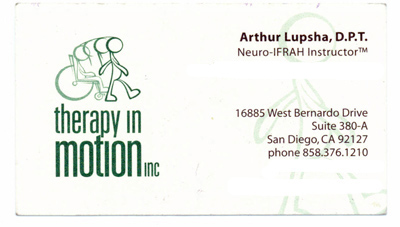
|

SARA-N-DIPITY PLACE
Two haikus consider friends, Judaism in 17 syllables each
|
By Sara Appel-Lennon
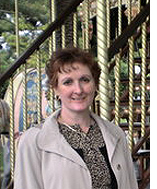 SAN DIEGO—As many of you know, Hal Wingard died on Monday, May 25th, 2009. Hal made many connections with family, friends, poetry, music, language.and many topics too numerous to mention. SAN DIEGO—As many of you know, Hal Wingard died on Monday, May 25th, 2009. Hal made many connections with family, friends, poetry, music, language.and many topics too numerous to mention.
I made a connection because of Hal. His first cousin, Peter Lemish, who now lives in Israel, spoke at the memorial service.
It turns out that Peter Lemish was my teacher when I attended the Miami High School in Israel Program when I was 17 years old and studied in Israel. Peter I enjoyed seeing you again.
I offer my condolences to the Wingard family.
Go to the top of right column
|
|
Here are two haikus I wrote recently:
Friends
True friends like flashlights
shine bright when they are needed
guide us through the dark
Judaism
Our shared traditions
Strong values and practices
Carried those before
|
|
|
MUSIC NOTES
The decline and fall of classical music began with audiences
|
By David Amos
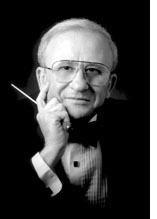 SAN DIEGO--If you have read my articles through the years, you know of the strong, positive tone which I try to convey, both about performances I have heard, and about the immediate future of classical music. But, let’s face it: Classical music is in trouble. SAN DIEGO--If you have read my articles through the years, you know of the strong, positive tone which I try to convey, both about performances I have heard, and about the immediate future of classical music. But, let’s face it: Classical music is in trouble.
We can point to increased attendances in some areas. Chamber music festivals in many places as well as our San Diego Opera do very well, but overall, we have seen a decline in attendance at classical music concerts. So many orchestras are struggling to stay afloat (some have closed), and our audiences are growing older with few of the younger crowd to replace them.
But, this is nothing new. We have known this for years. Many articles and books have been written on the subject. On the other side, we have recently heard strong opinions from people of high standing in the world of serious music who claim that things are not as bad as they may seem.
We do know, however, that there is a problem.
I am immersed in classical music every day of my life, and I communicate with family, friends, and professional acquaintances who share my interests. I am sure that many of you also live in this bubble and share your love for music with many others. But, this is not the way of the world anymore. Certainly a lot less than it used to be.
Let me cite a few personal examples.
A recent trip which I made to Florida is what inspired me to write this article. This was a trip that had little or nothing to do with music, and this is exactly what triggered my awareness of how unimportant, or irrelevant classical music is to most of the population. I met and mixed with dozens of people, veteran business men and women, educated, well read, cultured folks, world travelers, and many of them from foreign countries. By conversations during social moments that I have had with these people, many know of my involvement with classical music.
But, as our casual talk turned to subjects other than business, I sensed a curious uneasiness in many of them; they wanted to ask about “my other life," but did not know enough about it to even carry a superficial conversation. Some tried.
I was six days in Orlando and three in Miami. As I always do, I scanned the FM radio dial for any hint of classical music. No luck. There used to be a fine station of our beloved music in Miami for many years, but, alas, it is gone. The newspapers in both cities listed plenty of recitals, concerts, and operas by visiting and local organizations, but we all know that these programs touch a very small fraction of the population, and it is getting smaller.
During one of the flights, I read the complimentary airline magazine. It contained a large article about the recorded music
Go to top of right column
| |
industry and the serious problem of music piracy, how people download music from the internet for free, thusly affecting the
income and royalty structure of the artists and record labels. This was a good, long, comprehensive article, but devoid of a single mention of classical music. We are just not important enough for most people, no matter how much we would like to think we are.
Try this: Go outside your usual circle of friends and music lovers, bring up the subject of Hector Berlioz, and hear the results.
Our younger daughter was attending a political science lecture at UCLA about 15 years ago. There were over 500 students at the lecture hall. The professor tried to make a metaphor between a famous statesman, his importance in history, with the equivalent impact that Jascha Heifetz made to music. He asked for a show of hands; my daughter was the only one who knew of Heifetz!
Another painful example: In the Grammies, classical music is only an afterthought. It is an intrusion of what is primarily a commercial enterprise to award the stars of pop music. Its organizers have argued with me to the contrary, citing special classical music luncheons and the like, but the bottom line is obvious. Classical music does not fit into the big money scheme, and it ends up being an unwanted, annoying, puzzling, and ailing appendage.
Did you know that a few years ago a national chain of convenience stores was having problems with teenagers loitering in their parking lots? The solution was to play classical music through speakers, to scare away the groups that gathered there! We have become the equivalent of an insecticide.
Do you remember the classic Jack Benny programs on radio, and later television in the 1950’s? When Jack, in his many comedy routines playing the violin hit a couple of wrong notes in playing familiar classics, the audience roared with laughter. This is because the music was familiar to them, and the purposely played wrong notes were funny to hear. Most people today would not know the difference. It would not be funny at all, and, consequently, not entertaining.
It looks that we are heading in a few generations to the point where classical music will be for an even smaller cult group, live performances will become a rarity, performing organizations will virtually cease to exist, music schools including conservatories will become a handful worldwide, and the only way to hear classical music will be by the way of archival recordings of the past. We will become the subject of museums, historians, and an occasional musicologist.
If you doubt me, read Norman Lebrecht’s book When Classical Music Stops. It was later published with the title Who Killed Classical Music?
This article is not to find solutions, although I believe that there are options to alleviate this deteriorating condition. I’m hoping to graphically describe what I see as the unmistakable trends of the art form. Are we going to really do something about it?
|
| | | | | | |
| | | | 
